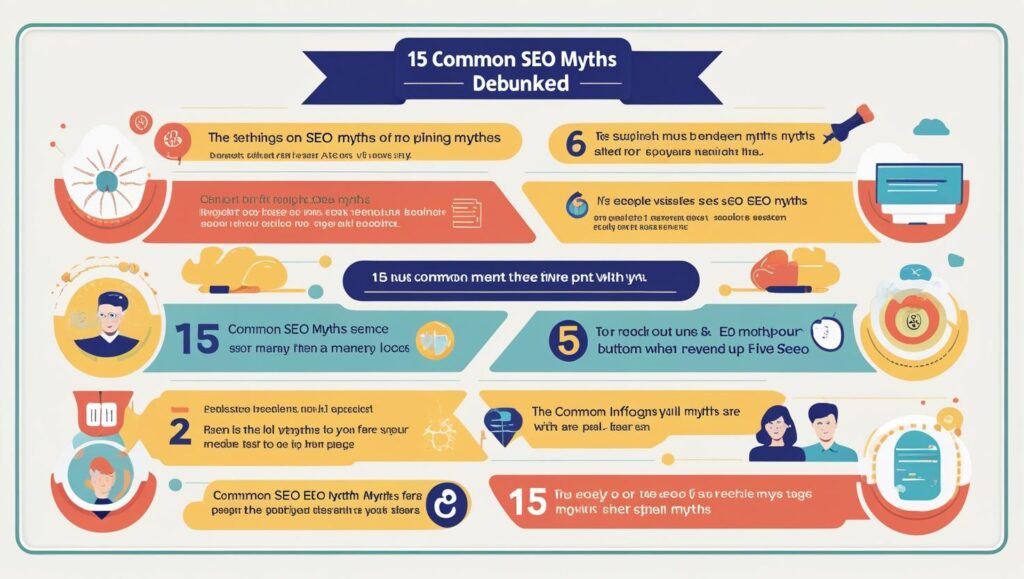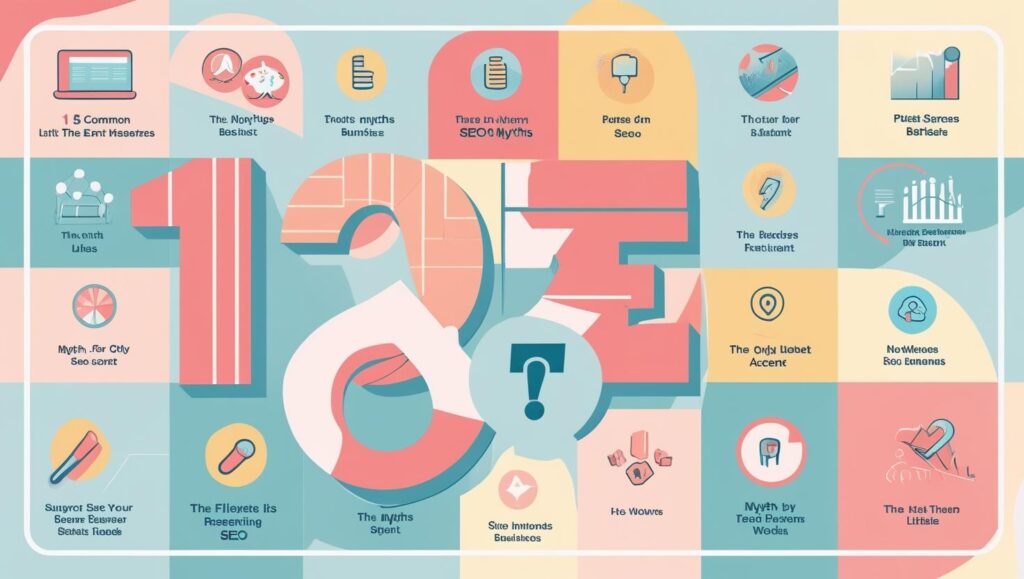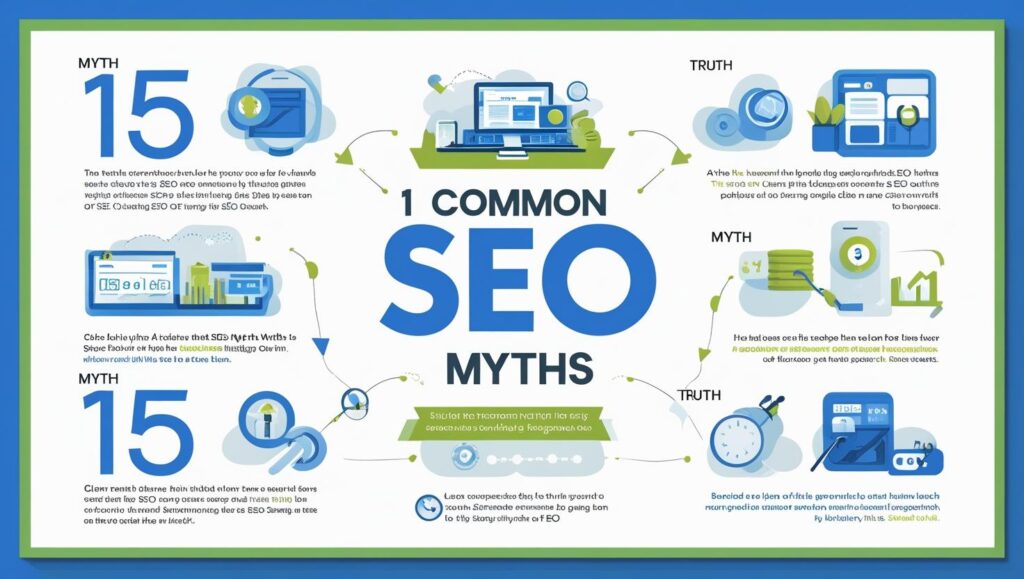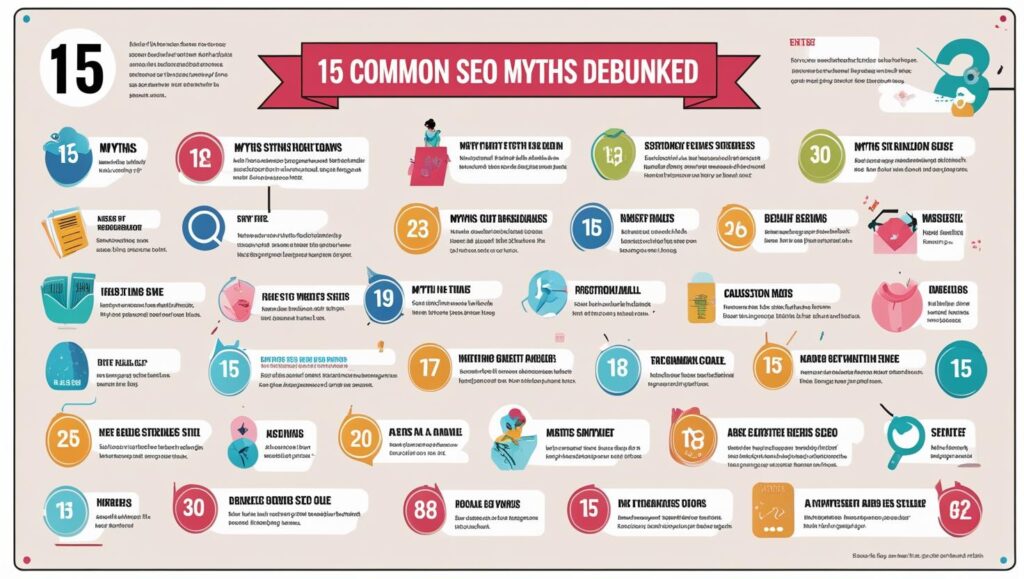SEO Myths Search Engine Optimization (SEO) is essential for online success, but the industry is filled with outdated tactics, misconceptions, and myths that refuse to die. With Google constantly updating its algorithms, what worked a few years ago may now harm your rankings SEO Myths.
In this blog, we’ll bust the 15 most common SEO myths that could be holding your website back in 2025. Let’s separate fact from fiction.
1. SEO Is a One-Time Task
The Myth: You only need to do SEO once and you’re set for life.
The Truth: SEO is an ongoing process. Google updates its algorithm constantly (core updates, spam updates, helpful content updates), so your site must keep evolving.
What to Do Instead:
- Regularly update your content
- Monitor technical SEO health
- Keep building relevant backlinks
- Stay updated with Google’s changes
2. Keyword Stuffing Improves Rankings SEO Myths
The Myth: The more times a keyword appears, the higher you rank.
The Truth: Keyword stuffing actually hurts SEO and user experience. Google penalizes over-optimization.
What to Do Instead:
- Focus on natural keyword placement
- Use synonyms and related terms (LSI keywords)
- Prioritize content quality over repetition

3. More Pages = Better SEO Myths
The Myth: Having hundreds of low-value pages boosts your rankings.
The Truth: Quality beats quantity. Thin, duplicated, or irrelevant content drags your site down.
What to Do Instead:
- Delete or merge thin pages
- Focus on creating useful, in-depth content
- Maintain content freshness
4. Meta Tags Don’t Matter Anymore
The Myth: Google ignores meta tags like title and description.
The Truth: While meta descriptions don’t directly affect rankings, they impact click-through rate (CTR), which can influence your rankings indirectly.
What to Do Instead:
- Write compelling meta titles and descriptions
- Include your focus keyword
- Keep them within character limits (Title: 60, Description: 160)
5. SEO Is All About Google
The Myth: Optimize only for Google and ignore other platforms.
The Truth: While Google dominates, platforms like YouTube (also owned by Google), Bing, and even social media have their own algorithms.
What to Do Instead:
- Optimize for YouTube SEO
- Use schema markup for Bing
- Ensure content is shareable on social platforms
6. Only High DA Backlinks Matter
The Myth: Backlinks from high Domain Authority (DA) sites are the only ones that help.
The Truth: Relevance, trust, and context matter more than DA alone.
What to Do Instead:
- Seek backlinks from niche-relevant websites
- Focus on anchor text diversity
- Avoid spammy or irrelevant backlinks
7. Exact Match Domains Give an SEO Edge
The Myth: Domains with exact keywords rank higher.
The Truth: Google devalues exact match domains if the content isn’t strong.
What to Do Instead:
- Choose a brandable domain
- Build quality content
- Optimize your site architecture

8. HTTPS Is Optional
The Myth: SSL certificates don’t affect SEO rankings.
The Truth: HTTPS is a confirmed ranking factor, and Google flags non-HTTPS sites as “Not Secure.”
What to Do Instead:
- Install an SSL certificate
- Ensure all internal links redirect to HTTPS
- Use tools to check for mixed content
9. Social Signals Directly Impact SEO
The Myth: Likes, shares, and followers boost your rankings directly.
The Truth: Google has stated that social signals aren’t a direct ranking factor—but they influence indirectly through engagement and brand visibility.
What to Do Instead:
- Promote content on social media
- Build a community around your brand
- Drive traffic that leads to backlinks
10. Longer Content Always Ranks Better
The Myth: 2500+ words = #1 ranking.
The Truth: Content length alone doesn’t determine rankings. Google values content relevance, depth, and user intent.
What to Do Instead:
- Answer the user’s query as efficiently as possible
- Use headings, bullet points, and visuals
- Don’t pad content just for the word count
11. Images and Videos Don’t Affect SEO
The Myth: Visual content doesn’t matter in SEO.
The Truth: Images and videos boost dwell time, engagement, and accessibility, which can influence rankings.
What to Do Instead:
- Use descriptive ALT tags
- Compress images for speed
- Embed videos and use schema markup
12. Local SEO Doesn’t Matter Unless You Have a Physical Store
The Myth: If you don’t have a storefront, local SEO is pointless.
The Truth: Freelancers, online service providers, and home businesses can all benefit from local SEO.
What to Do Instead:
- Claim your Google Business Profile
- Use local keywords and location-based schema
- Get listed in local directories

13. SEO Guarantees Fast Results
The Myth: You’ll see top rankings within a week or two.
The Truth: SEO is a long-term strategy. Results can take months, depending on competition and site health.
What to Do Instead:
- Set realistic expectations
- Track progress with Google Search Console and Analytics
- Focus on consistent growth
14. AI-Generated Content Is Penalized
The Myth: Google bans content written with AI tools.
The Truth: Google doesn’t care who creates the content—it cares about quality and helpfulness.
What to Do Instead:
- Use AI as a content assistant, not a replacement
- Always edit, fact-check, and personalize content
- Align content with Google’s EEAT principles (Experience, Expertise, Authoritativeness, Trust)
15. You Don’t Need SEO If You Run Ads
The Myth: Running paid ads eliminates the need for SEO.
The Truth: SEO and PPC complement each other, but ads stop working once you stop paying—organic SEO builds long-term value.
What to Do Instead:
- Invest in both paid and organic marketing
- Use PPC data to guide SEO keyword strategy
- Build a strong organic foundation
Bonus: How to Stay Updated with SEO Trends
SEO Myths SEO is constantly evolving, and following outdated myths can cost you traffic and credibility. Here’s how to stay ahead:
- Follow official sources like Google Search Central Blog
- Subscribe to SEO blogs (Moz, Ahrefs, Search Engine Journal)
- Join SEO communities on Reddit, Twitter, or LinkedIn
- Attend SEO webinars and workshops

Final Thoughts
SEO Myths world of SEO is full of advice—but not all of it is correct. Falling for these 15 SEO myths can lead you down the wrong path and waste your valuable time and effort. Instead, focus on proven, ethical, and user-first strategies.
Remember: SEO is about delivering the best experience to the user—and if you do that, search engines will reward you SEO Myths.
